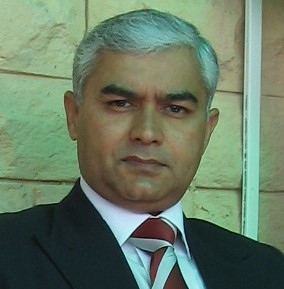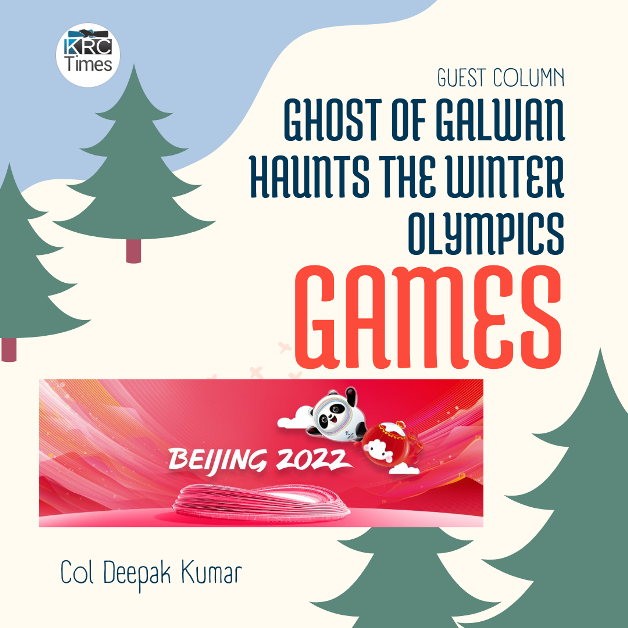Boycott of Olympic games by so many democratic nations has never happened earlier in the history of modern Olympics and should serve not only as a rebuke but also as a message that sports should always remain above politics of all kinds
 Col Deepak Kumar
Col Deepak Kumar

Qi Fabao, a regiment commander of the People’s Liberation Army of China, who was injured in Galwan Valley during the clashes with Indian Army troops in June 2020, was nominated as one of the torchbearers for the Olympic flame for the Winter Olympics commencing in Beijing from 04 February this year. Qui Fabao’s image was released recently by Global Times, a CCP owned English-language news platform in a tweet. The import of this provocative act was not lost on the Indian analysts. As soon as a tweet to this effect was made by the Global Times, Twitter went abuzz with reactions mostly from Indian Twitterati. It is in this context that the world needs to take notice of the politicisation of this prestigious international sporting event by an increasingly intransigent China that doesn’t respect international norms and conventions and rule based order. Though it is not the first time the ideologies have eclipsed the sport, it is indeed the first instance of weaponization of the sporting event violating the Olympic ideals of Friendship and Respect.
It was in Jun 2020 when Indian and Chinese troops had clashed in bloody unarmed combat using primitive tools such as steel poles and clubs in the Galwan Valley leading to casualties on both sides. However, China in a bid to project an air of supremacy has not fully disclosed the extent of its fatal casualties. It was only now that an Australian investigative journalist based on extensive scrutiny and research of Chinese social media and various deleted posts in Chinese electronic media platforms has confirmed that the Chinese side had suffered more than 40 fatal casualties in the conflict in the high Himalayas.
Though, this is not the first time international politics has eclipsed the bonhomie and the spirit of unity the games are intended to foster. During the Cold War the two superpowers had boycotted the Olympic games hosted by the respective country in 1980 and 1984 due to the clash of their ideologies, however, this time China’s attempt to weaponise the Olympic games is an altogether different level of politicisation of the Olympic games.
The flame, which was flown from Greece in October, travelled to various locations where competitions are being held, including Zhangjiakou in neighbouring Hebei province, before ending its journey with the lighting of the Olympic cauldron on the 04 Feb opening ceremony. More than 1,000 torch-bearers, mostly accomplished sportspersons participated in this flame relay.
Some Sinophiles tend to ignore the Chinese move of making a soldier part of a recent conflict with India a torchbearer as normal saying that over the course of modern Olympics many soldiers from various nations including India have participated in the Olympic games as athletes. However, when they say this, they miss a significant point that those participants came merely as athletes and not as soldiers. They all had significant sporting achievements to their credit before participation in the Olympics and their participation was not used as political signalling.
The participation of Qi Fabao, a Chinese PLA Colonel, however, is quite unusual and piquant. He seems to have no sporting history of any significance to speak of and has become a torchbearer merely on account of his participation in a bloody conflict with the Indian troops, in which he received serious head injuries, in the contested LAC region of Galwan. Carrying the Olympic torch is considered a honorous responsibility reserved for former athletes of high merit who have achieved international acclaim and recognition in their sporting disciplines. Nominating Qi Fabao for this honour is clearly meant to convey multiple political signals both at home and abroad.
The Chinese Strategy of warfare relies heavily on propaganda as part of psychological warfare. After receiving a bloody nose in the clashes with India, the morale of the PLA was low, the news of the more than 40 fatal casualties suffered during the clashes had leaked out and was hotly debated in Chinese social media. Though these news threads were quickly deleted, the critics were arrested and any further discussion on the topic was censored, domestically it damaged the strongman image President Xi Jinping is trying to project with a view to seeking a lifelong term as president. It is the typical mentality of a bully to project himself as a victor even if he has been pummelled nice and proper in a fisticuff because the bully fears nothing more than the loss of face. Nominating the PLA colonel is part of the same psychological game of concealing the bloody noose by projecting it as victory through the agency of Qi Fabao. It primarily serves to assuage the humiliation felt by the CCP in front of its party cadre and the domestic constituency of Xi Jinping while at the same time works to deliberately irk India. Both these ostensibly reek of the politicisation of the Olympics to project a domineering and supremacist image.
The goal of the Olympic Movement is to build a peaceful and better world by educating youth through sport practiced without discrimination of any kind and in the Olympic spirit, which requires mutual understanding with a spirit of friendship, solidarity, and fair play. How does China aim to achieve understanding, friendship and solidarity through such posturing is anybody’s guess?
While India had earlier not joined the western democracies like the US, UK, Canada, Australia and Lithuania who led the diplomatic boycott of the games, owing to widespread human rights abuse of the Uyghurs in Xinjiang and the overt hostility and belligerence displayed by China towards Taiwan. However, India had maintained a measured response so far by not politicising the games. This was despite the fact that India only had a lone athlete representing her in the winter Olympics. The inclusion of Qi Fabao, the PLA colonel as one of the torch bearers prompted India also to diplomatically boycott the games. Chinese act of politicisation of games and projecting an image of supremacy and belligerence is a clear violation of the ideal of the Olympic truce, which has also been vehemently endorsed by the UN General Assembly.
Boycott of Olympic games by so many democratic nations has never happened earlier in the history of modern Olympics and should serve not only as a rebuke but also as a message that sports should always remain above politics of all kinds. At the same time, the Olympic ideal of mutual understanding with a spirit of friendship and solidarity aimed at building a peaceful world has never been more relevant than today when there are disorder, transgressions of national sovereignties, threats to territorial integrity, and widespread human rights abuses by authoritarian regimes across the world.
Advertisement | KRC Foundation



